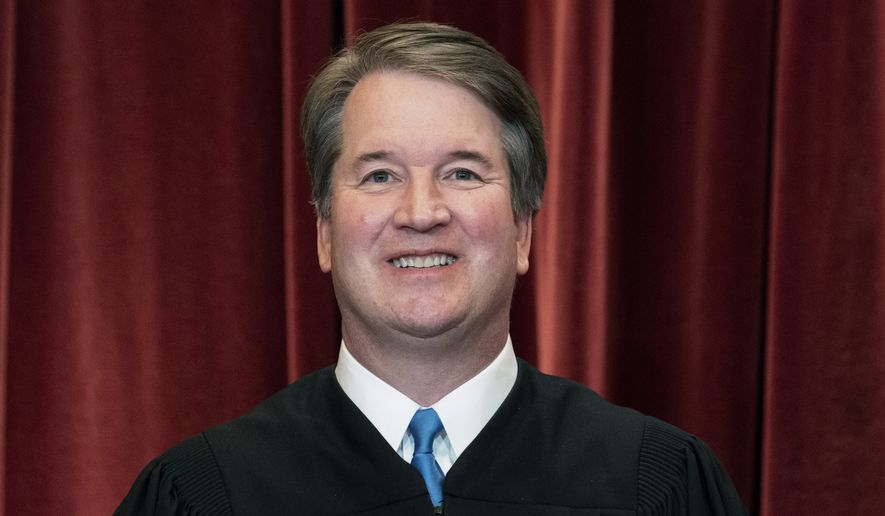It’s been more than 500 days since the federal government filed its criminal complaint against Nicholas Roske for his alleged plans to assassinate Supreme Court Justice Brett M. Kavanaugh — and still no trial date has been set.
Criminal law experts say it’s likely the government and defense counsel are negotiating a plea deal, suggesting Mr. Roske may never stand trial.
They also could be exploring mental health evaluations for a potential insanity defense should a plea agreement fall through.
“More than likely, this is going to end up in a plea,” said Robert Patillo, a civil rights lawyer who sits on the board of directors for the National Association of Criminal Defense Lawyers.
He said roughly 95% of federal cases end in deals rather than through a lengthy — or costly — trial.

Jonathan Fahey, counsel with Brown Rudnick LLP and a former state and federal prosecutor, said since Mr. Roske is locked up, there’s not necessarily a concern about the fairness to either Justice Kavanaugh, who is protected, or the defendant, who likely will get credit for time served.
“This is not the type of case that time would spoil the evidence,” he said. “It isn’t unfair to have him locked up in a speedy trial sense since the case is strong and he will likely be convicted and sentenced to prison time, so keeping him locked up pre-trial doesn’t harm him.
“It was probably also agreed to and he’ll likely get credit for the time he has served,” Mr. Fahey added.
Police arrested Mr. Roske, who was 26 at the time, outside the Montgomery County home of Justice Kavanaugh on June 8, 2022.
They said Mr. Roske confessed to being angry about the court’s pending rulings on abortion and the Second Amendment and planned to kill Justice Kavanaugh and himself to give his life a purpose.
Deputy U.S. marshals stationed outside the justice’s home spotted Mr. Roske as he exited a taxi. He then walked down the road and called 911 on himself. He said he had traveled from his home in Simi Valley, California, to kill a justice, had a firearm in his suitcase and was having suicidal thoughts, authorities said.
County police arrived and arrested Mr. Roske. They reported finding in his gear a Glock 17 pistol, a tactical vest, a tactical knife, ammunition, pepper spray, zip ties and a set of tools, including a crowbar, according to court documents.
Mr. Roske told a police detective that he was upset about the recently leaked draft opinion showing the high court was poised to overturn the 1973 Roe v. Wade decision that established a national right to abortion. He also said he was upset about the way he thought Justice Kavanaugh would rule in that case and in gun rights cases, the detective said.
“Roske stated that he began thinking about how to give his life a purpose and decided that he would kill the Supreme Court justice after finding the justice’s Montgomery County address on the internet,” FBI Special Agent Ian Montijo, a member of the Joint Terrorism Task Force, said in an affidavit.
Mr. Roske was charged with violating a law that forbids attempting or threatening to kidnap or kill a federal judge. If convicted, he could spend the rest of his life in prison.
He is in federal custody.
In July 2022, his attorneys moved to suppress the statements he made to law enforcement expressing his intent to kill the justice on the day of his arrest.
In a motion filed in U.S. District Court in Greenbelt, Maryland, Mr. Roske’s attorneys requested a hearing on whether their client spoke voluntarily to law enforcement.
But the court did not rule on the motion. It did, however, agree to remove the August 2022 trial date from the docket. A new date has not been set.
The two sides, Mr. Roske’s defense team of Andrew Szekely and Meghan Michael, and the federal prosecutor on the case, Kathleen Gavin, have been giving Judge Peter J. Messitte, a Clinton appointee, status updates that indicate the two parties will brief the court in two to three months.
Mr. Szekely and Ms. Gavin did not respond to a request for comment.
Ms. Michael left the federal public defender’s office this month, according to an auto-response message from her email.
According to legal filings, the government has consented to the defense team’s numerous requests for more time to investigate the charges.
In a less than 10-minute status hearing in November 2022, the judge suggested at a certain point he may order a mental health evaluation of Mr. Roske.
During the exchange, Mr. Roske noted he was on medication but understood he was in a federal courthouse.
“It is always possible — the court doesn’t get involved in plea discussions, but they may eventuate, and if they were to eventuate, I still would need to be able to evaluate the ability of Mr. Roske to appreciate and understand what’s being discussed by way of plea,” reads a transcript of the hearing.
Since there are some sealed documents in the docket, legal experts note mental health could be at play in the delay.
Jonathan Turley, a professor at George Washington University Law School, said Mr. Roske’s case fits the profile for either a plea deal or an insanity defense.
For an insanity defense, Mr. Roske’s lawyers must establish he admitted to the wrongdoing, but was unable at the time of the offense to differentiate between right and wrong because of mental illness.
“With the exception of an incapacity defense, it is hard to see a defense for Roske who quickly removed any doubts by making a series of incriminating statements,” Mr. Turley said.
• Stephen Dinan contributed to this report.
• Alex Swoyer can be reached at aswoyer@washingtontimes.com.




Please read our comment policy before commenting.